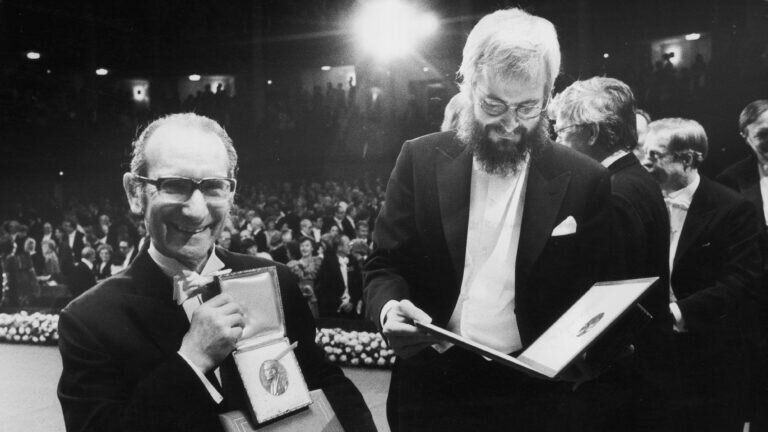Philanthropy Should Help Fund Exceptional Young Scientists
The below op-ed originally appeared on https://www.statnews.com/2020/11/12/philanthropy-should-fund-exceptional-young-scientists/
César Milstein (left) and Georges Köhler after their joint award (with Niels Jerne) of the 1984 Nobel Prize in medicine. Köhler was only 29 in 1975 when, with Milstein, he discovered the technology for producing monoclonal antibodies.
By Gary Michelson and Wayne C. Koff
Nov. 12, 2020
Even as governments around the world have responded to the Covid-19 crisis by making unprecedented commitments of billions of dollars toward vaccine and therapeutic development and trillions more for economic stimulus, this pandemic may be stifling our ability to respond to the next ones that are certain to come.
Below the radar are large-scale hiring freezes, job cuts, and uncertainty for younger researchers and faculty members who represent the future of science.
Even before the pandemic, young researchers were among the least likely to get funded and the situation will only get worse unless steps are taken now. Philanthropy can make a significant impact here by supporting young scientists with disruptive ideas to transform our response to major global diseases, including the prevention of future pandemics. Technological advances in science are coming faster than any time in history, and young scientists are the most willing to apply their skills to high-risk, paradigm-shifting ideas to rethink what is possible.
Einstein once observed, “A person who has not made his great contribution to science before the age of 30 will never do so.” He may have been a bit aggressive about picking age 30, but he was in the ballpark.
Georges Köhler was only 29 in 1975 when, with César Milstein, he discovered the technology for producing monoclonal antibodies, the foundation for cancer, autoimmune, and Covid-19 immunotherapy today, work that earned them the 1984 Nobel Prize in physiology or medicine along with along with Niels Jerne. David Baltimore was 32 when he discovered reverse transcriptase, the enzyme used to transfer information from RNA to DNA, a discovery that greatly expanded the field of tumor virology and enabled the rapid development of therapies for HIV/AIDS. He shared the 1975 Nobel Prize in physiology or medicine for this work with Howard Temin and Renato Dulbecco.
For the next Köhlers and Baltimores, opportunities for discovery is more challenging than ever because there is little funding available for exceptional young scientists. Since the 1980s in the U.S., the average age for investigator-initiated research grants has increased nearly a decade, from the mid-30s to mid-40s. While the National Institutes of Health has recently attempted to address some of the challenges faced by young scientists, with programs such as the New Generation Researchers Initiative, catalytic and flexible philanthropic support can have a major impact.
We now live in an extraordinary period for science. Technological advances from biomedical and engineering sciences to artificial intelligence and machine learning have converged to enable formerly unimaginable leaps towards unraveling life’s fundamental mechanisms. These, in turn, are radically rethinking our approaches to fighting disease.
Building on the sequencing of the human genome and the genomic revolution, the 2020 Nobel Prize in chemistry winners, Jennifer Doudna and Emmanuelle Charpentier, discovered CRISPR-Cas9, a new method for editing genomes, highlighting the speed of scientific advances and the impact of basic research for transformational health applications.
Understanding and harnessing the human immune system is the next frontier in biomedicine. It holds the key for new vaccines and therapies against major global diseases, from noncommunicable diseases such as Alzheimer’s, cancer, and diabetes to infectious diseases such as HIV, Covid-19, and preventing the next pandemic. Recognizing this potential, our organizations, the Michelson Medical Research Foundation and the Human Vaccines Project, are partnering on a critical piece of the global effort to decode the human immune system. We identify — and support — the next generation of brilliant young scientists and incentivize them via a research prize program to focus their efforts on developing disruptive technologies merging human immunology, protein engineering, systems biology, and AI.
This venture joins other philanthropies, like the partnership between the Blavatnik Family Foundation and the New York Academy of Sciences, and the Pershing Square Foundation, which award prizes to young scientists who have the potential to transform the future of human health.
After the emergence of severe acute respiratory syndrome in 2003, Middle East respiratory syndrome in 2012, and Covid-19 in 2019, it is no longer a question of if another coronavirus with pandemic potential will emerge, but when. The same applies to emergent threats from other virus families, such as influenza, flaviviruses (Zika and dengue), filoviruses (Ebola and Marburg), and others.
Less than one year after the emergence of SARS-CoV-2, the virus that causes Covid-19, several vaccines are already in late-stage clinical trials. One or more may be licensed in the next few months. Even with these efforts having reduced the traditional time for vaccine development from more than 10 years to less than two, Covid-19 has caused devastating social, economic, and health impacts across the globe.
We can no longer be reactive when it comes to infectious diseases.
Philanthropy can fill a specific niche and complement government-sponsored grants by funding young scientists for high-risk, high-impact science. Philanthropy can move rapidly and take risks that government funders will not. For example, philanthropic efforts can be directed toward decoding the human immune system, which will enable future breakthroughs such as discovering novel approaches for universal vaccine development.
We can stop the next pandemic in its tracks, but to do so, we need the country’s brightest young scientists to start working on it now.
Gary K. Michelson is an orthopedic surgeon, a member of The Giving Pledge, and the founder and co-chair of Michelson Philanthropies, which includes the Michelson Medical Research Foundation. Wayne C. Koff is president and CEO of the Human Vaccines Project and adjunct professor of epidemiology at the Harvard T.H. Chan School of Public Health.

